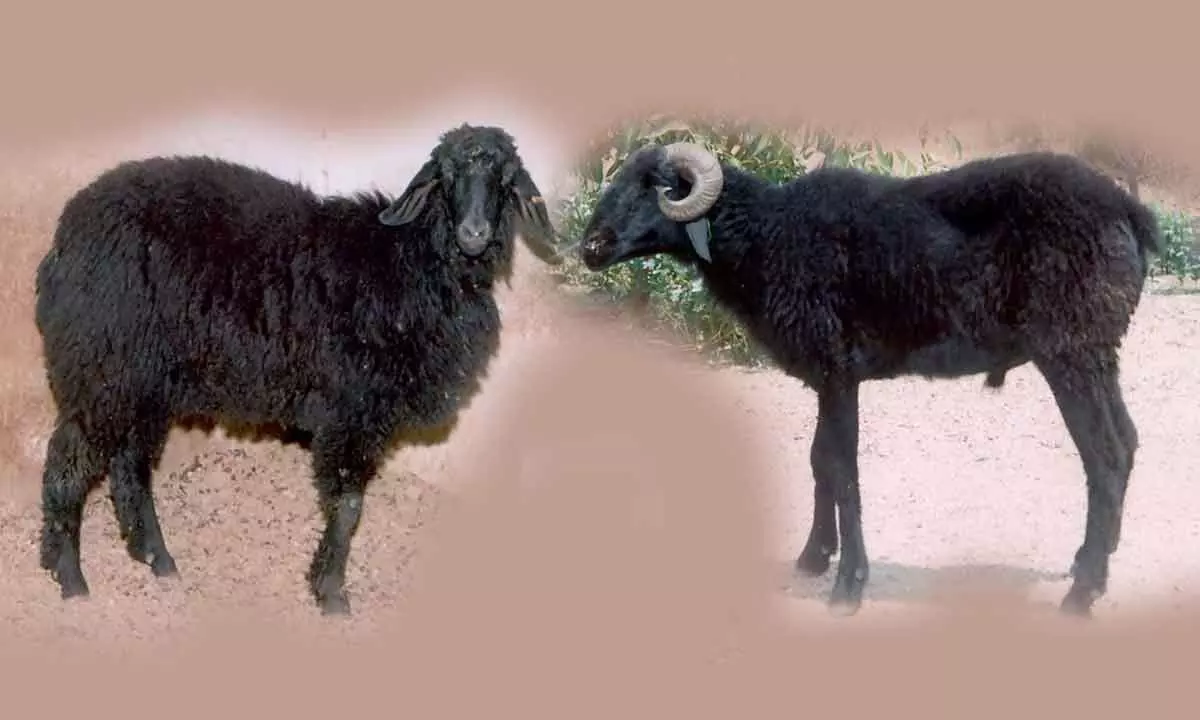Just In
TS Deccani sheep teetering on the brink of extinction


- The Deccani sheep variety exhibited extensive distribution across the sprawling Deccan plateau encompassing Maharashtra, Telangana, and Karnataka States
- This distinctive breed showcases a sleek neck, slender chest, and notable spinal structures
Hyderabad: Deccani sheep, once a pride of Telangana State, are on the brink of extinction as they face fierce challenge from sheep breeds imported from different States in India. With their dwindling population and loss of traditional grazing lands, urgent measures are needed to protect and revive this iconic breed before it fades into history.
The Deccani sheep variety exhibited extensive distribution across the sprawling Deccan plateau encompassing Maharashtra, Telangana, and Karnataka States. This distinctive breed showcases a sleek neck, slender chest, and notable spinal structures.
With a Romanesque nose and gracefully drooping ears, its predominantly ebony coat is complemented by hints of gray and roan. Within the breed’s territory, diverse lineages such as Lonand, Saangamneri, Solapuri (Sangola), and Kolhapuri have emerged, known by the local populace.
The Deccani breed is rapidly declining in Telangana, as it is increasingly being crossbred with non-wool hairy mutton sheep varieties like Nellore in Andhra Pradesh, Madgyal in Maharashtra, and Khillari in Karnataka. In Telangana, one can predominantly observe the Nellore Jodpi breed, characterised by its white coat (palla), white coat with black facial spots (Jodipi), and red-brown coat (dora). Now, the Deccan has evolved into a new breed.
Speaking to The Hans India, Dr. S. Ramchander, Managing Director, Telangana State Sheep and Goat Development Co-operative Societies Federation, said, “The productivity of the Deccani sheep breed has proven to be considerably low, rendering it economically unviable for the majority of farmers in the region.
In the realm of sheep farming, wool serves as a prized asset for shepherds. In the past, there existed families skilled in the art of weaving kambali, a traditional blanket crafted from the wool sourced from Deccani sheep.”
Shearing wool is another significant aspect related to Deccani sheep. Previously, several shepherd families would collect wool from farmers and skillfully transform it into traditional blankets. Regrettably, in modern times, the absence of such families or individuals involved in this craft is very negligible, he added.
The Deccani breed of sheep primarily developed in regions prone to drought, exhibiting remarkable resilience to climate conditions. Interestingly, around 30 to 40 years ago, these sheep would undertake seasonal migrations to other states between the months of January and July.
Dr. B. Ekambaram, Director of Research, P.V. Narasimha Rao Telangana Veterinary University, Hyderabad, said, “Among the 50 diverse sheep breeds found across different agro-climatic zones in India, the Deccani breed has the widest geographical distribution, encompassing various regions of the Deccan plateau. In addition to being climate resilient, the Deccani breed demonstrates notable disease resistance compared to other sheep breeds.”
Renowned for its high-quality meat, this breed was particularly favored for the preparation of Hyderabadi Biryani.
Furthermore, they exhibit eco-friendly grazing habits, as they refrain from uprooting plants, thereby preventing the loss of grass variety in the region. The support from the state government is also required for the conservation of the sheep as it faces the challenge of extinction, he added.
Today, there exists a sheep breeding farm in Mahbubnagar to study and improve the productive and reproductive performance of Deccani sheep, where they are carefully chosen based on body weight at weaning and six months. Through designated matings, superior rams are utilized.
The growth of lambs is regularly monitored, with the top 10 percent of ram lambs and 30 percent of ewe lambs selected as replacement stock, thus enhancing the overall performance of the flock. The Government of India (GoI), through the National Livestock Mission, has allocated a sum of Rs. 3.6 crores for the purpose of intensive propagation and conservation of the Deccani sheep breed as it aims to facilitate the preservation and promotion of this valuable breed.

© 2024 Hyderabad Media House Limited/The Hans India. All rights reserved. Powered by hocalwire.com






